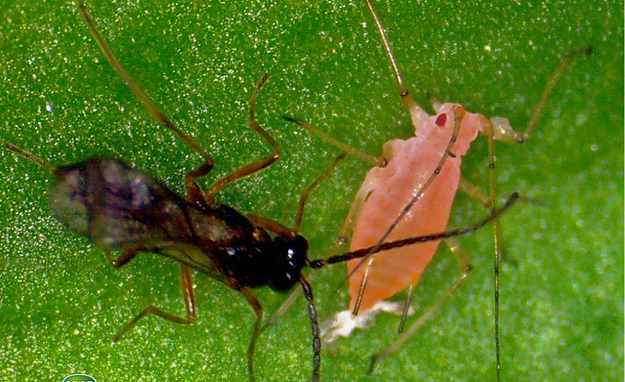Aphids are one of the most destructive crop pests; for many growers it is truly their worst nightmare. Throughout the years, Aphid control in many crops has been depending on using chemical pesticides with the active ingredient of imidacloprid. Imidacloprid is currently in the process of being phased out due to its harmful effect on honeybees and on the environment in general.

Crop Defenders
Declining effectiveness
One known biological control that is effective on Aphids is Aphidius spp; however, over time growers have seen declining effectiveness – Aphidius isn’t performing to the same standard as it was known for previously.
One of the main factors of this drop in performance has to do with changes in rearing methods. As demand for the Aphidius spp increased, insectaries adjusted their rearing methods to become more commercially viable, and to ease the burdens of production. One example of this is rearing insects on unnatural hosts or artificial diet. This shift towards rearing methods that are less representative of in the field conditions is impacting the insects’ ability to survive and establish once they are released in crop.
X-rays
Another factor working against current Aphidius performance in Canada is the impact of the importation process when being transported to Canada and cleared for entry. Security x-rays can render insects to become sterile and unable to lay eggs to its full potential. Aphidius spp needs to be able to lay eggs in order to parasitize and ultimately kill the aphids in the crops.
Driven to solve the needs of Canadian growers, Crop Defenders Ltd, the local Canadian bio control company, decided to invest in establishing an efficient, sustainable, and reliable biological solution to the ever-worsening Aphid problem. As a result of advanced R&D efforts and significant financial investments, Crop Defenders’ team of experts has achieved an extraordinary breakthrough. "By rearing an indigenous strain of Aphidius Ervi that is two times bigger than its imported peers, we have developed a product that is distinctly superior to anything available in the market, out-performing the other strains in field efficacy by extensive margins," the team with Crop Defenders says.
During these initial phases of production, Crop Defenders Ltd. has developed the limited capacity to service neighboring growers and are building towards capacity for mass production.
Crop Defenders Ltd.’s accomplishments and potential in this pursuit were recently recognized by FedDev Ontario. Crop Defenders’ “Aphidius JERVI Strain Mass Production” project was selected by FedDev Ontario to receive significant project support to be used to bring the JERVI rearing project to the level of mass production. The project was selected by FedDev because of it’s impact on local growers (primarily Vegetable, Cannabis and Ornamental growers); it’s positive impact on the local economy in job creation, increased commitment to local/domestic investment; and it’s display of cutting edge innovation.
In response to the many inquiries being receiving from growers and IPM professionals alike, Crop Defenders Ltd. will be hosting a webinar on "Overcoming the Challenges in Controlling Aphids in Cannabis, Ornamental and Vegetable Greenhouses" and to answer all questions related to "Aphidius JERVI strain and its efficacy.
Webinar: 10:00 to 11:00 am Thursday 26th November 2020
Reserve your seat
Growers and IPM professionals register here
Media and Press register here
For more information:
Crop Defenders
info@cropdefenders.com
www.cropdefenders.com
